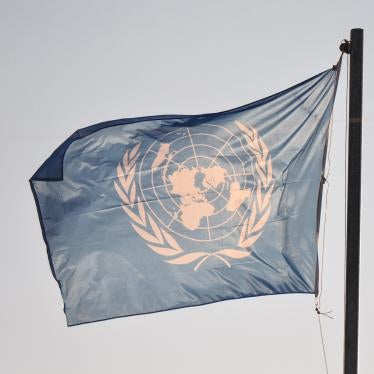July 7, 2011
The Honorable Mr. Barack Obama
President of the United States of America
The White House
1600 Pennsylvania Ave, NW
Washington, DC 20500
By Mail: to above address
By Fax: (202) 456 2461
By Email: C/O Mr. Daniel Russel (Senior Director for Asian Affairs) and Ms. Samantha Power (Senior Director for Multilateral Affairs) at the National Security Council
BURMA: Banking Sanctions and Establishment of a United Nations Commission of Inquiry
Dear President Obama,
It has now been almost two years since your administration launched its new engagement policy with the military government in Burma. Senior officials from the State Department have visited the country several times, met with Burma's leaders, and tried to persuade them to implement positive changes in the country, as demanded by the people of Burma and the international community. The steps they have urged include (1) unconditional and immediate release of all political prisoners, (2) establishment of a substantive dialogue with democratic forces led by the National League for Democracy and the ethnic minorities of Burma on transition to democratic government under the rule of law; and (3) allowing humanitarian assistance to populations affected by armed conflict in all regions of Burma as described in the Tom Lantos Block Burmese JADE Act 2008 (The JADE Act). Sadly, as of today, these conditions remain unfulfilled.
Even as Burma's government rejects these steps towards genuine democracy, Burma's military, which continues to rule the country under the guise of civilian government, has returned the country to the brink of full-scale civil war. Since completing the establishment of its new, ostensibly civilian governing structures, the Burmese army continued military offensives against ethnic resistance groups in Karen and Karenni States, and began military operations in Shan and Kachin States. These armed groups in opposition to the government have refused to accept Burma's undemocratic constitution, and to transform their armed forces into border guards under the command of the Burmese army. Between May and June of this year, scores of ethnic villages were destroyed, hundreds of ethnic people and common prisoners were used as porters and human minesweepers, and the property and belongings of ethnic minorities were looted by the Burmese army. Villagers have been arrested, tortured and killed by Burmese troops on accusations that they were supporters of the ethnic resistance groups.
Tens of thousands of villagers have been displaced and fled to the Thai-Burma and China-Burma borders. Credible reports have emerged of cases of sexual violence against women and girls by Burma army troops. These reports are in line with extensive documentation of sexual violence perpetrated by Burmese military personnel over many years. More than 13,000 Kachin refugees are now taking shelter in Laiza, at the China-Burma border and thousands more are taking refuge inside Chinese territory. The number of refugees is expected to grow more as fighting continues. It is no surprise that the Office of the United Nations High Commissioner for Refugees recently listed Burma as the fifth largest source country of refugees in 2010, with 415,700 refugees.
The Burmese government has given your administration no reason to believe that more diplomacy, absent greater internal and external pressure, will persuade it to change course. The time has come for the United States to use the levers of pressure at its disposal, and implement in full the banking sanctions authorized in the JADE ACT. The United States should also mobilize support for a UN Commission of Inquiry to investigate war crimes and crimes against humanity in Burma, recommended by UN Special Rapporteur Mr. Tomas Ojea Quintana and supported by Burma's democracy leader Daw Aung San Suu Kyi.
The JADE Act authorized the U.S. government to impose targeted financial sanctions on former and present leaders and officials of Burma's ruling government, current or former officials of the security services and judicial institutions of the junta, and any other Burmese persons, who provide substantial economic and political support for the junta, as well as their family members. The Department of Treasury has placed the names of a number of Burmese officials and entities to its Specially Designated Nationals (SDN) list (though no new names have been added in the last two years). However, the impact of financial sanctions on individuals and entities alone diminishes over time as the targets find ways to move their assets to other countries, use the Euro instead of the American dollar, engage with intermediaries to make U.S. dollar transactions, and set up front companies to cover up their real identities and businesses.
Therefore, it is crucial that the additional sanctions contained in the JADE Act, which allow the Treasury Department to target banks holding the Burmese government's hard currency reserves and financing its economic activities, be fully implemented. As we have seen in the case of Libya, financial sanctions can be effective when implemented vigorously, backed by the full enforcement powers of the Department of the Treasury. If your administration is indeed committed to "maintaining" sanctions against the Burmese government, it should be doing everything in its power to maintain their effectiveness.
On March 29, 2011, a bipartisan group of Senators, including Dianne Feinstein (D-CA), Mitch McConnell (R-KY), Barbara Boxer (D-CA) and Mark Kirk (R-IL), sent a letter to Secretary Clinton, in which the Senators stated "The National League for Democracy party, led by Daw Aung San Suu Kyi, asserts that financial sanctions can be effective and targeted to only members of the military junta and their associates." They urged Secretary Clinton "to exercise the authority for additional banking sanctions against Burma's leaders explicitly provided by Congress in Section 5 of the JADE Act." We fully support their call. If your administration remains committed to maintaining sanctions against the Burmese junta, it should be implemented.
We also urge you to launch a vigorous diplomatic effort to win support at the UN for a Commission of Inquiry to investigate war crimes and crimes against humanity in the Burmese military's campaigns against ethnic minority groups. On June 22, 2011, in her first ever address to the United States Congress, Daw Aung San Suu Kyi stated: "I support [UN Rapporteur Tomas Quintana's] call for such a commission, making it quite clear that a commission of inquiry is not tribunal. It is simply a commission of inquiry to find out what human rights violations have taken place and what we can do to ensure that such violations do not take place in the future. I would appreciate everything that is done to help Professor Quintana in his work." The need for such a Commission has only increased in the last several weeks with the escalation of armed conflict in Burma's ethnic areas.
To sum up we would like to request you to take the following actions on Burma as soon as possible:
(1) Implement in full the authority for additional banking sanctions contained in the JADE Act.
(2) Launch an effort to establish a UN Commission of Inquiry to investigate war crimes and crimes against humanity in Burma.
We are looking forward to receiving your reply soon.
Best regards,
Tim Ryan, Director, Asia Regional Program
American Center for International Labor Solidarity (Solidarity Center)
Cathy Feingold, Director, International Department
American Federation of Labor and Congress of Industrial Organizations (AFL-CIO)
David Dorn, Director, International Affairs
American Federation of Teachers
Ruth W. Messinger, President
American Jewish World Service
Karin D. Ryan, Human Rights Program
The Carter Center
Don Kraus, Chief Executive Officer
Citizens for Global Solutions
Dokhi Fassihian, Executive Director
Democracy Coalition Project
John C. Bradshaw, Executive Director
Enough Project
Katherine Spillar, Executive Vice President
Feminist Majority Foundation
Ellen Bork, Director of Democracy and Human Rights
Foreign Policy Initiative
David J. Kramer, President
Freedom House
Mark Hanis, Co-Founder
Genocide Intervention Network/Save Darfur Coalition
Tad Stahnke, Director of Policy and Programs
Human Rights First
Tom Malinowski, Washington Advocacy Director
Human Rights Watch
Michele Bohana, Director
Institute for Asian Democracy
Jerry Fowler, Senior Policy Analyst
Open Society Foundations
Mike Mitchell, Partner
Orion Strategies
Jared Genser, Managing Director
Perseus Strategies
Hans Hogrefe, Chief Policy Officer and Washington Office Director
Physicians for Human Rights
Randall Schriver, President and Chief Executive Officer
Project 2049 Institute
Dr. Thaung Htun, Executive Director
The Burma Fund-UN Office
Nancy Soderberg, Former U.S. Ambassador to the United Nations and Current President of the U.S. Connect Fund
Aung Din, Executive Director
U.S. Campaign for Burma
Copies sent to:
(1) House Committee on Foreign Affairs, through Chairwoman Ileana Ros-Lehtinen and Ranking Member Howard Berman
(2) Senate Committee on Foreign Relations, through Chairman John Kerry and Ranking Member Richard Lugar
(3) Ms. Hillary Clinton, Secretary of State, U.S. Department of State
(4) Mr. Timothy Geithner, Secretary of Treasury, U.S. Department of Treasury
(5) Mr. Thomas E. Donilon, National Security Adviser
(6) Original co-sponsors of the JADE Act, Senators Mitch McConnell, Dianne Feinstein, John McCain, Richard Durbin, Representatives Joseph Crowley, Peter King and Donald Manzullo
(7) Mr. Derek Mitchell, Nominee for U.S. Special Representative and Policy Coordinator for Burma
(8) Media
Contact Person:
Aung Din
Executive Director U.S. Campaign for Burma
1444 N Street, NW Suite #A2 Washington, DC 20005
Tel: (202) 234 8022
Fax: (202) 234 8044
aungdin@uscampaignforburma.org
http://www.uscampaignforburma.org/







